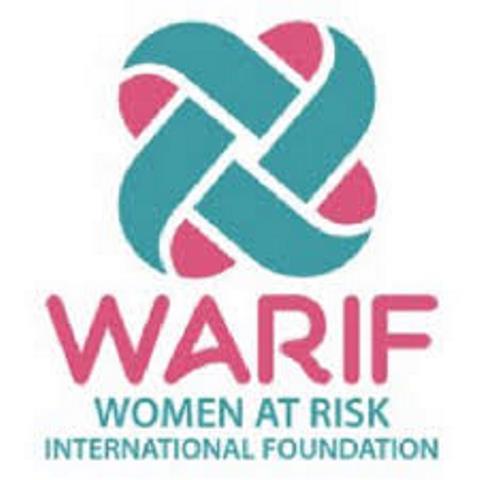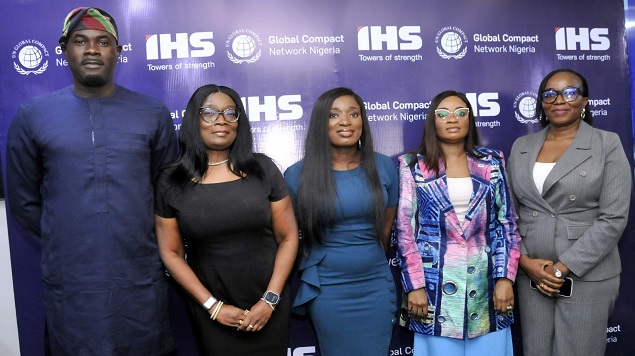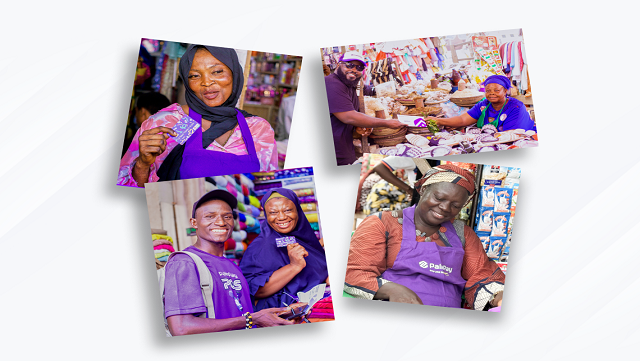General News
WARIF Completes First Cycle of Its Rural Sensitization Program on Covid-19

In the months since COVID-19 was first reported in Nigeria, rippling effects with devastating impacts have been felt across the global economy and on individual livelihood.

The crisis, characterized by border closures and lockdowns, comes as a shock to the majority impacting not only the economical but physical and mental health of many within and beyond the Nigerian constituencies.
In Nigeria, rural communities make up the largest portion of these constituencies and in this crisis, these communities are particularly important, as they are among the most vulnerable. However, most of the burdens of COVID-19 in rural areas have been under the radar.
For rural households, the impact of the virus will likely be felt first in compromised livelihoods. The health impact, however, cannot be overlooked or understated. With the gradual ease of the lockdown coupled with a fast-rising number of reported cases, Women at Risk International Foundation (WARIF), one of the nation’s foremost NGOs tackling the prevalence of gender-based violence in Nigeria, have observed that the pandemic and disruption of the present moment is one which requires efficient sensitization on safety protocols for survival while also addressing the prevalence of domestic and sexual gender-based violence within their communities.
Shocking statistics by WARIF revealed that domestic violence has surged since the initial period of the coronavirus lockdown.
This led to the NGO re-opening its centre to cater to survivors of sexual violence. This decision was made after the NGO observed a 64 per cent increase in call cases, during the lockdown mandated by the Federal Government in March 2020.
Dr Kemi DaSilva-Ibru, Founder of WARIF, voiced the need for a more aggressive sensitization scheme for rural communities – “There is an urgent need for rural communities to be sensitized about these pandemics as they have little access to adequate healthcare facilities’’.
Building on this, WARIF has become more concerned with sensitizing rural communities around the state about the pandemic. Through a recently launched Covid-19 response initiative, the NGO commenced a one-month sensitization program designed to engage women in grassroots communities.
The relevance of initiatives like this cannot be overemphasized, as programs targeted at the most vulnerable individuals within the society ultimately influence the greater good of the society.
It is all about education, information and sensitization; and individuals, government and non-governmental organizations (NGO) all play a critical role in making sure the right information and materials get to the people within these communities.
In response to this urgent consequence of the pandemic, WARIF has also implemented safety planning protocols to assist survivors in need of help. These protocols designed and implemented by the organization to protect both adults and children are aligned with the recently released set of procedures by the UN to keep children safe while the pandemic lasts.
WARIF has noted that it is one thing to propose a sensitization program and another to maximize its efficiency. This is why the program has been implemented through the leverage the support of trained Traditional Birth Attendants (TBAs) from the WARIF Community Gatekeepers Project, a pre-existing initiative by the NGO.
The Traditional Birth Attendants were identified to carry out this sensitization as they are familiar with the people and the environment. These trained attendants, already educated on the prevalence of domestic and sexual gender-based violence within their grassroot communities and the immediate response and management of these cases, have been galvanized into small cell groups and are making house to house visits in their various communities to offer assistance to women who are residing with their spouses and partners.
The Traditional Birth Attendants will go into communities weekly to create awareness on services provided at the WARIF center and identify if there has been an increase in cases of sexual and domestic abuses. Cases of abuse in these households are being identified and recorded and are referred to the WARIF Rape Crisis Centre.
It is commendable to note that WARIF had successfully completed the first cycle of its rural sensitization program which engaged 10, 774 individuals in Alimosho, Kosofe, Apapa, Epe and Ikorodu LGAs of Lagos state. Regardless, there is still much work to be done as private sector inclusion and partnerships are encouraged by the NGO.
It is no news that women are still at risk during this period and this is why WARIF through its initiative aims to get first-hand insight to GBV cases within these communities and engage survivors with all the support they require. This is a major factor which lead to the NGO’s Police Awareness Initiative, which gives survivors access to a select number of police stations across Lagos.
In these stations, there are assigned officers to assist survivors with their cases and protect them from any further harm from the perpetuator. With collaborations such as this, WARIF is ensuring that survivors can get prompt and satisfactory responsiveness from the police in locations closest to them.
In its 2020 vision, WARIF aims to impact I million lives and as far has successfully influenced 340,000 people this year. The NGO continues to operate a 24-hour confidential helpline (0809 210 0009) to assist survivors of gender-based violence in Nigeria.
General News
IHS Nigeria, United Nations Global Compact Host High-Level Dialogue on Sustainability and Greener Business Practices in Nigeria

IHS Nigeria, in collaboration with the United Nations Global Compact Network Nigeria, hosted a high-level private sector dialogue themed “Collaborative Strategies for Greener Business Practices, Innovation and Sustainable Development”.

The event, held in Lagos, brought together key players from different sectors including finance, law, telecommunications, biodiversity, and corporate sustainability to explore actionable pathways to achieve meaningful environmental stewardship in Nigeria.
The panel session offered bold perspectives on integrating sustainability into business frameworks across different sectors, whilst dispelling myths, and highlighting opportunities for organizations, and calling for collective action from all players within the business value chain.
Delivering a keynote address, Titilope Oguntuga, Director, Sustainability at IHS Nigeria, emphasized the urgency of environmental consciousness: “Sustainability is not a destination — it’s a collective journey.
“It requires courage to transform, vision to lead, and collaboration to scale. Nigeria stands at a crossroads. We can either be overwhelmed by the risks or rise to become a beacon of green innovation and inclusive growth in Africa. The choice is ours — and the time is now.”
Sylvie Josel, Lead, Biodiversity and Nature-Based Solutions at the United Nations Global Compact, joined virtually from New York and spotlighted nature as a strategic asset:
“Nature must no longer be treated as an afterthought. It underpins everything, from human rights to supply chains. Embedding biodiversity into a company’s core strategy isn’t just a risk mitigation measure; it’s a smart, future-forward business imperative”.
Lanre Babalola, Group Head, Climate Finance and Sustainability at the Bank of Industry (BOI), provided insights into how BOI is funding sustainable ventures and driving innovation: “We look beyond profitability; we look at environmental and social impact. Whether it’s plastic roads, biogas, or solar transitions, we support businesses that are not only bankable but capable of reshaping the future.”
From the legal perspective, Oyeronke Oyetunde, General Manager, Regulatory Affairs, MTN Group, drew attention to the regulatory challenges hindering sustainability adoption: “Our legal frameworks are trailing behind today’s sustainability realities. We need forward-thinking laws, reduced regulatory silos, and incentives that reward the right behavior. Sustainability can’t thrive where enforcement is weak, and taxation is excessive.”
Abimbola Agbejule, Head, Corporate Sustainability and Responsibility at Wema bank, spoke passionately about inclusiveness in sustainable development: “You don’t need to start big to make impact. MSMEs make up a huge part of our economy. Sustainability should be embedded in their day-to-day activities, and we must democratize access to knowledge, tools, and partnerships.”
The session was moderated by Gloria Okorie, Head of Programs at the United Nations Global Impact Center.
The event closed with a resounding call to action for stronger legal frameworks, deeper collaborations, and inclusive capacity building across sectors. The event further reinforces IHS Nigeria’s position as a leader in corporate sustainability and innovation in Nigeria.
“At IHS Nigeria, we recognize that true progress happens when sustainability is not an obligation, but a culture, lived every day, across every unit,” Titilope Oguntuga added.
Through initiatives like this dialogue, IHS Nigeria and its partners continue to champion solutions that protect the planet, empower people, and ensure long-term business viability.
General News
Bridging the Digital Divide: Over 700 Young Africans Empowered by Paradigm Initiative

Paradigm Initiative (PIN), a leading digital rights and inclusion nonprofit, has revealed in its 2024 Annual Impact Report that over 707 young individuals across 11 African countries have been empowered through its flagship LIFE Legacy Programme.

The initiative delivers training in life skills, ICT, financial literacy, and entrepreneurship—transforming underserved communities across the continent.
In 2024, the LIFE Legacy Programme ran 25 training cohorts across Cameroon, DRC, Ghana, Kenya, Senegal, South Sudan, Liberia, Uganda, Tanzania, Zambia, and Zimbabwe. In Senegal, 60 laptops were distributed to local partners, while digital literacy programmes were launched in schools in Cameroon and Tanzania through the LIFE@School initiative.
PIN advanced its advocacy by supporting 29 legal cases in Ghana, Kenya, and Nigeria. A notable success was the landmark judgment in Molehin v. UBA, where the bank was found guilty of violating data privacy laws.
PIN’s research and media efforts made powerful waves. The Londa digital rights report, covering 26 countries, was downloaded 8,457 times. Its fourth short film, Undersight, recorded nearly one million views on YouTube. PIN also developed an AI strategy report with TrustLaw and collaborated with the Centre for Democratic Technology to assess content moderation policies for Kiswahili across Kenya and Tanzania. A separate report highlighted the troubling deployment of surveillance technologies across Africa, which was referenced in direct advocacy engagements with a telecom operator.
The organisation’s advocacy also contributed to the adoption of the African Commission’s Resolution 580, which urges governments to avoid Internet shutdowns during elections—strengthening digital freedom across the continent.
Meanwhile, the Digital Rights and Inclusion Forum (DRIF) convened in Accra attracted 1,004 delegates from 61 countries, strengthening regional collaboration and amplifying the voice of civil society. PIN’s strategic communications pushed its media reach to 1.43 billion and social media engagement to 8.8 million.
Alongside training and policy efforts, the organisation inspired young changemakers through youth-focused campaigns and hosted seven fellows under the Digital Rights and Inclusion Learning Lab (DRILL) fellowship.
Crowning a year of impact, PIN earned the maiden PrivCon Privacy Award in Nigeria and was recognised in the Social Innovation Category at the Nigeria Innovation Awards for its work connecting African youth to digital opportunity.
General News
PalmPay’s Bold Move For Social Impact in Northern Nigeria

In the busy Fagge Market in Kano, Zahra Bello, a middle-aged entrepreneur who runs a fabric store, speaks about her experience with mobile banking and how this has simplified business transactions and improved her small business.

Behind the growth of these resilient women entrepreneurs lies a story of transformation powered by technology.
“My name is Zahra Bello, I’m from Dambatta in Kano State, and I’m a fabric trader. I first heard about PalmPay from my elder brother in March 2024. He told me how he used the PalmPay Target Savings feature to buy new machinery for his farm and even earned interest. That inspired me to try it too.”
Zahra downloaded the PalmPay app that very day. By December, she’d used the Target Savings plan to restock her shop with new fabrics, an achievement she never thought possible within such a short period. “I was so happy,” she smiles. “The interest I earned on my savings motivated me to save more. PalmPay has become my savings box. I use it for all my transactions now.”
Her story, like many others, is the inspiration for PalmPay’s evolving vision of inclusive banking in Nigeria’s underserved communities.
Women, SMEs, and Technology
Financial exclusion remains a critical challenge in Northern Nigeria. According to EFInA’s 2023 Access to Financial Services survey, an estimated 28.8 million adults in the North are excluded from the formal financial system, with exclusion rates as high as 47% in the Northwest.
Among women, especially those in rural areas, the figures are even more concerning, as these numbers represent the daily reality of millions of women who run informal businesses and contribute to household income without access to banking, credit, or digital tools.
PalmPay’s initiative addresses this gap directly. 5,000 female entrepreneurs in Kano and Kaduna will receive hands-on financial literacy training on mobile payments and their shops are rebranded with signages, aprons, and other kits that will enhance visibility for their businesses.
“I used to write down every sale in a notebook. Now I track everything with my PalmPay account,” says Rabi Abdullahi, a trader in Kano. “Customers trust me more now that I have a business name and branded store.”
PalmPay has done its due diligence to understand the challenges and has offered a tailored approach to solving these issues which includes this social impact initiative.
Social Impact and Strategic Growth
With over 35 million users in Nigeria, the company is keen to expand in regions where smartphone adoption is rising but digital finance penetration remains low.
Femi Hanson, Head of Marketing and Communications, explains: “We see this as long-term ecosystem building. When you give small business owners the tools to grow, you don’t just gain users, you build loyalty, trust, and sustainable impact.” This also aligns with Nigeria’s Financial Inclusion Strategy goal to reach 95% inclusion by 2025, a benchmark that can’t be reached without focused efforts in the North.
The project has earned the support of traditional leaders, most notably His Royal Highness, the Emir of Kano, Dr. Muhammadu Sanusi II, who praised the initiative and called for greater collaboration between the private sector and community stakeholders.
With the success of this initiative, PalmPay has continued to expand its solutions in these regions offering support to even more women.
In Northern Nigeria, where the need is great and the gap wide, PalmPay is proving that true impact goes beyond offering products to providing support and meeting the needs of its users at the grassroots.

 Telecom2 days ago
Telecom2 days agoALTON Clarifies on Migration to End-User Billing for USSD Services

 News3 days ago
News3 days agoDigital Africa Global Consult, NDPC Partner on Ground-Breaking “Nigeria Data Challenge” Initiative

 E-Financial2 days ago
E-Financial2 days agoNigerian Stock Market Suffers ₦183 Billion Loss Amid Profit-Taking

 News2 days ago
News2 days agoDStv Rewards Loyal Customers with Free Package Upgrades

 Telecom2 days ago
Telecom2 days agoLagos Future Conference 2025: Stakeholders Call for Digital Responsibility and Grassroots Innovation

 General News2 days ago
General News2 days agoAfrican Parliamentarians Seek Answers from Telcos on Quality of Service

 E-Financial2 days ago
E-Financial2 days agoSEC Working on Stablecoin Regulation Framework

 News2 days ago
News2 days agoFCCPC Orders Air Peace to Appear Over Alleged Refund Violations


















